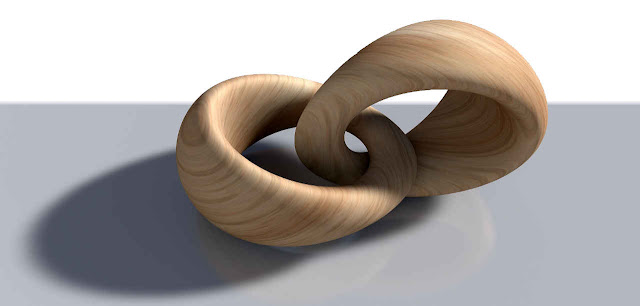Yet another story about transformations (part 2)
based on an untitled image by Ralf Kunze
|
This where the story gets interesting.
When we talk about infinity, like walking that circle (again and again and again), we have a sense of something that continues to "grow" as we discover it. If we take all the numbers between two and three, we'll have another example of infinity. Instead of walking around a circle forever, we can zoom in forever —2.1 to 2.9... 2.01 to 2.99... 2.001 to 2.999 and so on—and never see all the numbers as we follow Zeno down his rabbit hole.1
There's a bit of a paradox hiding here. As my Dad put it after reading the first part, "The basic assumption of infinity is limitlessness,"2 At the same time, there is no infinity that contains everything. In each case, there's always a proverbial Santa's Bag. Every infinity has some sort of boundary or edge. I'll never get to the end of the set of numbers between 2 and 3 or to the end of the circle.
If you anthropomorphize things, infinite wants to be more (infinite). Infinities are, in a very basic way, creative. Merriam Webster defines creative as:
1 : marked by the ability or power to create : given to creating (the creative impulse, a creative genius)The first two can be subsumed into the idea of giving birth. To be creative is to (1) have the power and desire to (be given to) create (2) something not imitative ... something that hasn't existed before. As I keep walking through my life on that circle, each step is a new one. But, creating, birthing implies not just new but different. And, at times, something that (in the spirit of definition 3) is beyond existing limits.
2 : having the quality of something created rather than imitated : IMAGINATIVE (the creative arts, creative writing)
3 : managed so as to get around legal or conventional limits (creative financing)
also : deceptively arranged so as to conceal or defraud (creative accounting)3
A problem theism and atheism both have to address is "why the universe?" A person I work with brings up the origin and evolution of life as well as the birth of the solar system and asks why? Why all those stars?
Some points in the universe are so far away, that if light left them at the beginning, it would not have reached us. That unobservable universe is estimated to be at least 250 times larger than what we can see.4 We live in a universe that is, at least effectively, infinite. According to some theorists, it is actually infinite.
I suspect that part of what's behind his thinking is that so far we've seen no traces of intelligence in the universe. In a universe this vast, it's mind-boggling that we're not flooded with broadcasts of the sitcoms from a million galactic civilizations. Where is all the intelligent life? What's the point of all those stars? We certainly don't need them. Heck, what's the point of the amazing diversity of life that's evolved on this planet?
To take it a step further, what's the point of having another child on a planet that has already has billions of people? Richard Dawkins famously asserted evolution was governed by the selfish compunction of genes to spread themselves.5 That doesn't explain the urge to create or the existence of a universe in the first place.
The answer is reflected in us. We reflect what we came from including the universe and that which underlies and sparked the universe. We share it's characteristics. The universe itself is regarded as creative by any number of thinkers.6, 7 We birth children, music, poetry and youtube videos because the urge to create and birth is one of our characteristics.
1. To be exact, "Achilles Paradox", one of four paradoxes Zero proposed. When the tortoise gets a headstart on Achilles, Achilles has to cover half the distance to the tortoise ... and then half the remaining difference to the receding tortoise ... and so on. Thus Achilles will never catch the tortoise. "Achilles and the Tortoise" in "Zeno’s Paradoxes" (Stanford Encyclopedia of Philosophy): https://plato.stanford.edu/entries/paradox-zeno/#AchTor (accessed 1/24/2019).
2. Charles Wood by email (2/19/2019). The full quote is "The basic assumption of infinity is limitlessness, otherwise one is not defining a concept but creating a infinite array of possible defining characteristics".
3. "Creative," Merriam-Webster Dictionary. Reformatted for clarity and emphasis. https://www.merriam-webster.com/dictionary/creative (retried on 1/16/2019)
4. "It took centuries, but we now know the size of the Universe," BBC.com: http://www.bbc.com/earth/story/20160610-it-took-centuries-but-we-now-know-the-size-of-the-universe
5. Richard Dawkins, The Selfish Gene, Oxford University Press.
6. Paul Davies, "Creativity special: The complexity of the universe", New Scientist, 26 October 2005, https://www.newscientist.com/article/mg18825232-100-creativity-special-the-complexity-of-the-universe/ (retrieved January 15, 2019)
7. Stuart A. Kauffman, Humanity in a Creative Universe, Oxford University Press (2016). Kaufman is professor emeritus at the University of Pennsylvania, a theoretical biologist, complex systems researcher, and 1987 winner of the MacArthur Genius Grant who studies the origin of life on Earth.



Comments
I think a more interesting concept is Panentheism. Panentheism accepts there is separation between the universe and the divine but that the divine pervades the universe and interpenetrates every part of it. It is usually paired with the idea that, in order for god to actually interact with us and have compassion for us, he has to experience that interaction... and, at some level, be changed by it. In essence, there is an unchanging eternal side of god and one that, over time changes as it interacts with us.